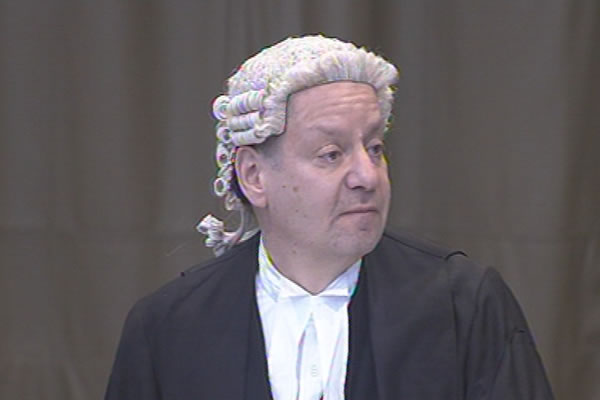Home
GENOCIDE WAS 'CUMULATIVE EFFECT OF A SERIES OF CRIMES'
Croatia's representatives argue that Serbia knew about 'genocidal activities in the Vukovar area but failed to do anything to prevent them. The representatives also spoke about the relevance of the Tribunal's judgments, the discretionary right of the chief prosecutor not to indict anyone for genocide in Croatia, the campaign aimed at creating the Greater Serbia and the crimes which confirm the arguments, as Croatia alleges
 Phillippe Sands, professor of the international law
Phillippe Sands, professor of the international law Today, Croatia's representatives continued presenting arguments at the hearing on the merits of the case in which Croatia accuses Serbia of violations of the Convention on the Prevention and Punishment of the Crime of Genocide. The suit was filed in 1999. Croatia presented additional arguments which, in its view, prove that 'genocide is not a numbers game'.
International law professor Phillippe Sands recalled that according to the provisions of the Convention, the intent to 'destroy fully or in part' and ethnic, racial or religious group in an area is a requisite element of genocide. As Sands argued, the existence of the intent will depend on the 'opportunity' that presents itself to the perpetrators to destroy a group. He illustrated his point by using several Croatian villages in Eastern and Western Slavonia: the Serb forces razed the villages to the ground, killing all the inhabitants they found there: 10, 20 or 100 of them, it did not matter. According to the British professor, genocide was committed in those villages.
Sands also noted that by 13 October 1991, if not sooner, the top military leadership in Belgrade learned about 'Zeljko Raznatovic Arkan's genocidal activities' in the Vukovar area, but failed to do anything to prevent the crimes and punish the perpetrators. A report by the military intelligence service states in no uncertain terms that 'Arkan's men committed uncontrolled acts of genocide', Sands said, and that there is 'incontrovertible evidence' that the JNA 'knew about it'.
British barrister Kier Starmer pointed out the importance of the ICTY cases and trials held against JNA officers accused for the crimes committed in Vukovar area as well as against Milan Martic, Jovica Stanisic and Franko Simatovic tried for the crimes committed in the area of Krajina. He noted that Milan Babic’s guilty plea was of a great importance as he had confirmed before the Tribunal that Slobodan Milosevic commanded JNA and all the incorporated forces to it that are held responsible for the crimes Serbia is accused of.
Starmer added that the Office of the Prosecutor at the Tribunal had the 'discretionary right rather than an obligation' to issue indictments for genocide in Croatia. The fact that no such indictments have been issued has 'small or no bearing' on the merits of the law suit filed by Croatia against Serbia. He recalled that the Tribunal tried individuals for specific crimes, while in this case, the International Court of Justice must render its judgment on the 'cumulative effect of a series of crimes'. In order to prove it, Croatia will, as Starmer indicated, call evidence on the crimes that have not been dealt with by the Tribunal, such as the destruction of Vukovar and the crimes against the detainees in the Velepromet warehouse in Vukovar.
Jana Spero from the Croatian Justice Ministry noted that in the course of the genocidal campaign, the Serb forces 'killed more than 12,500 Croats, 865 are still missing, dozens of people suffered grievous bodily or mental harm, hundreds of thousands of homes and 1,400 religious buildings were destroyed, more than 7,700 Croats went through detention centers in Serbia and other parts of the former Yugoslavia, and more than 550,000 people were displaced'. Those crimes were committed against Croats, 'simply because they are Croats', Spero said, adding that they were committed as part of a pattern, with the intent 'to destroy a part of the Croatian population and establish the Greater Serbia'. They were committed by the forces that included the JNA, the Territorial Defense, the police and the paramilitaries under the control of the Serbian State Security Service, operating under the control and with the support and coordination from Serbia.
Professor Sands then provided some specific examples that according to him prove the existence of the genocidal intent. As he noted, the campaign involved the vilification of Croats, carving Serb nationalist symbols on the Croats' bodies and forcing Croats to wear white bands that 'recall the campaign of deliberate racial destruction'. Sands also mentioned sexual violence which was aimed at preventing births in the group, and examples where entire Croatian villages were wiped out. Apart from the genocidal intent, he concluded, there was no other reason for the destruction of hundreds of cultural monuments and places of worship. Sands recalled that the Serb forces deployed in Croatia received financial, logistic, and military support from Serbia, which did nothing to prevent genocide.
In the afternoon session, Serbia's representatives cross-examined witnesses Frane Kozul and Sonja Biserko, whose written statements were tendered into evidence by Croatia. The contents of their evidence will remain under seal until 1 April 2014, when the oral arguments before the International Court of Justice are set to end.Linked Reports
- Case : Croatia vs. Serbia
- 2014-03-03 CROATIA: GENOCIDE IS NOT A NUMBERS GAME
- 2008-11-18 INTERNATIONAL COURT OF JUSTICE CONFIRMS IT HAS JURISDICTION IN CROATIA VS. SERBIA CASE
- 2008-05-30 CROATIA: DISMISS SERBIA’S OBJECTION
- 2014-03-05 PATTERN OF ATTACK AND ‘CLEAR INTENT TO DESTROY’
- 2014-03-06 CROATIA: SERBIA RESPONSIBLE FOR CRIMES COMMITTED BY JNA AND SERBIAN TROOPS
- 2014-03-07 IS THERE EVIDENCE OF SERBIA’S ‘GENOCIDAL INTENT’?
